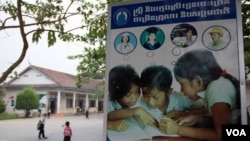Phorn Chan Bonavy is a 6th grader at Kesaraream Elementary School in Siem Reap, where First Lady Michelle Obama just completed a three-day visit—the first sitting first lady to do so.
Phorn Chan Bonavy says she wants to finish high school, but she is concerned that she might drop out, to help her family earn a living, like so many other girls across the country have had to do.
However, she seems determined to complete school, even though that will require she help her family. “If I have to help my parents, I would work and study at the same time,” she said.
Van Marath, the school principal, says she is excited about the first lady’s visit and hopes her “Let Girls Learn” program, which will take place in 11 countries around the world, will help girls like Phorn Chan Bonavy realize their dreams.
“I think ‘Let Girls Learn’ is a very good program because our Cambodian tradition values boys and leaves girls behind,” she said. “But now we are focusing on girls.”
Part of the program will be to support community-led solutions through the Peace Corps, which is already working in more than 60 countries, including Cambodia.
Addressing volunteers here on Saturday, Obama said education can be important beyond an individual.
“When girls get educated, when they learn to read and write and think, that gives them the tools to speak up and talk about injustice and demand equal treatment,” she said. This “helps them participate in the political life in their country and hold their leaders accountable, to call for change when their needs and aspirations aren’t being met.”
Visiting a local high school earlier in the day, the first lady also pointed out the importance of investing in girls’ education, and in convincing others of that importance. “It’s going to be up to you all to help make the argument that investing in you is the best thing that your family can do for you and for their community,” she said.
Around the world, 62 million girls are not in school. School dropout rates among female students in developing countries like Cambodia also remain a concern.
Education Minister Hang Chuon Naron said poverty can be a big impediment to girls’ education, and he welcomed the first lady’s initiative, “so that Cambodian girls and women can be educated as those in developed nations.”
Cambodia’s first lady, Bun Rany, called Obama’s visit “historic,” and said it would be helpful for Cambodian girls and young women to reach their higher educational goals. “We should try to get all the benefits from this initiative, especially so that we are able to study,” she said.
Pung Chhiv Kek, president of the rights group Licadho, who joined a round table discussion with Obama, said the first lady’s visit “encourages everyone to pay attention, especially to girls’ education.”
“Let Girls Learn” will have a lot of positive impacts, she said. “Although we might not see them immediately, I am confident in the future we will.”




